In today’s fast-paced tech world, developers need to stay ahead by constantly honing their skills and learning new technologies. Whether you are a seasoned programmer or a novice just starting out, having access to the right coding platforms can make all the difference. These platforms offer a range of tools, tutorials, and community support to help developers at every level improve their coding proficiency and stay updated with the latest industry trends. In this article, we will explore the 12 best coding platforms that can help you enhance your development skills and accelerate your career growth.
12 Best Coding Platforms for Code Learning
Choosing the right coding practice platform ensures a smooth and effective learning experience for aspiring programmers. For instance, platforms can cater to your specific needs and help you take your coding skills to the next level. Here are the top 12 best coding websites to learn to code.
1. LeetCode
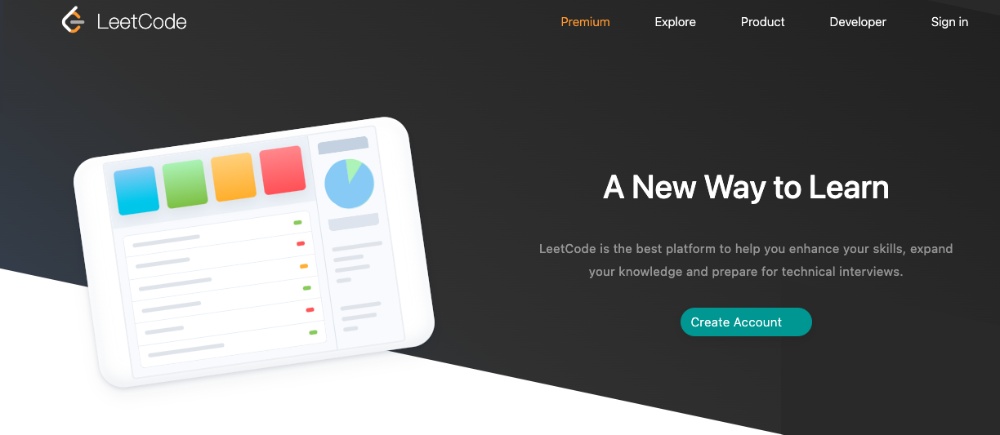
LeetCode is one of the most popular coding platforms, known for its extensive collection of coding challenges and problems that cover a wide range of topics, including algorithms, data structures, databases, and more. It is widely used by developers to prepare for technical interviews at top tech companies.
Pros:
- Extensive Problem Library: LeetCode offers over 1800 problems, catering to all difficulty levels from beginner to advanced.
- Weekly Contests: Regular contests provide an opportunity for developers to test their skills against others and improve their rankings.
- Company-Specific Problems: LeetCode features problems that have been asked in interviews at top companies like Google, Facebook, and Amazon.
- Discussion Forums: Active community forums where users can discuss problems, solutions, and interview experiences.
- Learning Resources: Detailed explanations and solutions for problems, along with educational articles and tutorials.
Cons:
- Limited Free Content: Many of the advanced problems and features require a premium subscription.
- Steep Learning Curve: Some beginners might find the problems too challenging without additional guidance or learning resources.
- Less Focus on Collaborative Learning: Compared to some other platforms, LeetCode focuses more on individual problem-solving rather than collaborative projects.
2. HackerRank
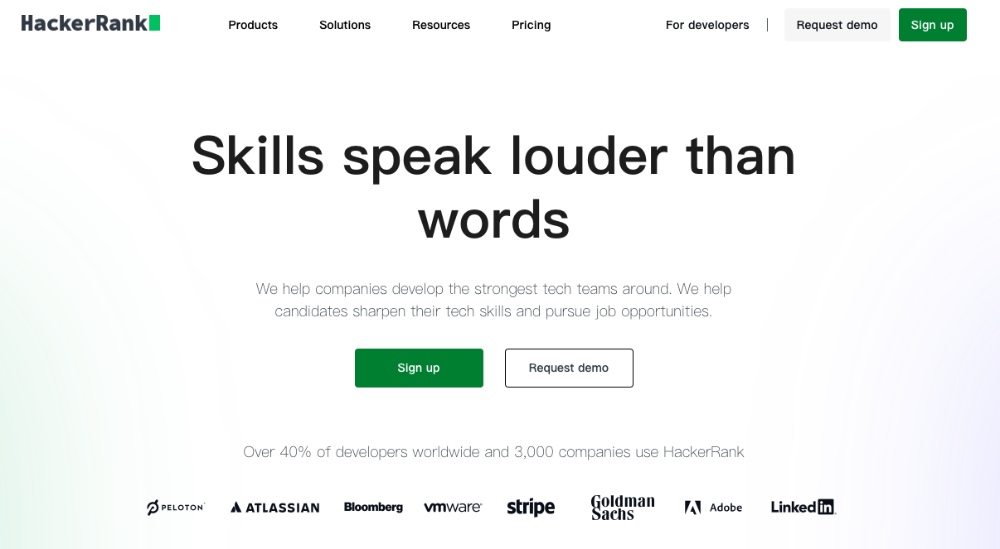
HackerRank is a versatile coding platform that provides a wide array of coding challenges, competitions, and interview preparation kits. It is designed to help developers improve their coding skills and prepare for technical interviews. HackerRank also partners with companies to help them source and assess technical talent.
Pros:
- Diverse Problem Set: HackerRank covers multiple domains including algorithms, data structures, AI, databases, and more.
- Interview Preparation Kits: Comprehensive preparation kits for various companies and technical roles.
- Certifications: Users can earn certifications in specific skills which can be shared on LinkedIn and resumes.
- Company Challenges: Direct challenges from companies looking to hire, providing a direct path to potential job opportunities.
- Interactive Environment: Code editor with instant feedback, making it easier to learn and correct mistakes on the go.
Cons:
- Limited Advanced Content: Some advanced problems and specific domain challenges might be limited compared to other platforms like LeetCode.
- User Interface: Some users find the user interface less intuitive compared to other platforms.
- Quality of Discussions: The discussion forums are not as active or helpful as those on some other platforms.
- Advertisements: The free version of HackerRank includes advertisements, which can be distracting for some users.
3. Codecademy

Codecademy is a comprehensive coding practice platform that offers interactive coding lessons in various programming languages. It’s a great choice for those looking to learn to code.
With its easy-to-use interface and engaging lessons, Codecademy is a top choice for teaching coding to beginners. It features hands-on coding exercises, interactive quizzes, and projects to help you practice your skills. Furthermore, it provides a supportive environment for coding education.
Pros:
- Interactive Learning: Hands-on coding exercises with instant feedback.
- Structured Curriculum: Well-organized courses with a clear progression path.
- Wide Range of Topics: Covers multiple programming languages and technologies.
- Beginner-Friendly: Great for beginners with no prior coding experience.
Cons:
- Limited Free Content: Many courses and advanced content require a Pro subscription.
- Lacks Depth for Advanced Users: This may not be challenging enough for more experienced developers.
- Limited Offline Access: Courses require an internet connection to access.
4. Udemy

Udemy has established itself as a go-to online platform for coding education, offering various courses on multiple topics. Udemy’s extensive library of coding courses caters to your needs and skill level.
The classes are led by instructors who use video tutorials, practical exercises, and real-world projects to enhance the learning experience. So, if you’re looking to hone your coding skills, Udemy is a fantastic choice.
Pros:
- Large Course Selection: Thousands of coding courses on various topics.
- Lifetime Access: Once purchased, courses can be accessed forever.
- Frequent Discounts: Regular sales make courses affordable.
- Variety of Instructors: Learn from industry professionals and experienced educators.
Cons:
- Quality Variability: Course quality can vary significantly between instructors.
- No Formal Structure: Courses are not part of a structured curriculum.
- Limited Interaction: Less interactive than some other platforms; learning is more passive.
5. Coursera

Coursera is a premier online educational coding platform, offering coding courses from reputable universities and institutions. This makes it a prime destination for those seeking to advance their coding knowledge.
Coursera’s coding courses are designed to be interactive, offering hands-on coding exercises and real-life projects. This innovative approach makes the learning journey both enjoyable and impactful. That’s why Coursera is a top choice for anyone looking to master coding skills.
Pros:
- High-Quality Content: Courses are developed by top universities and industry leaders.
- Accredited Certificates: Earn recognized certificates and even degrees.
- Structured Learning Path: Comprehensive specializations and professional certificates.
- Financial Aid Available: Options for those who cannot afford the course fees.
Cons:
- Cost: Many courses and certifications require payment.
- Less Hands-On: Some courses are more lecture-based and less interactive.
- Fixed Schedule: Courses often follow a set schedule, limiting flexibility.
6. FreeCodeCamp

FreeCodeCamp, a non-profit coding platform to teach code, provides a complete curriculum of coding lessons, projects, and certification programs. With an emphasis on hands-on coding and practical, real-world projects, it offers a valuable learning experience.
The platform’s unique approach combines in-depth instruction with tangible coding projects, ensuring that students gain practical experience and build their coding skills meaningfully. Whether you’re a beginner or an advanced coder, FreeCodeCamp is a fantastic resource for anyone looking to teach themselves coding.
Pros:
- Completely Free: All content is available for free.
- Project-Based Learning: Hands-on projects to build real-world coding skills.
- Strong Community: Active community support through forums and local study groups.
- Comprehensive Curriculum: Covers full-stack web development and more.
Cons:
- Self-paced: Requires self-discipline to stay on track.
- Limited Feedback: Less personalized feedback compared to paid platforms.
- Basic Interface: The user interface is functional but not as polished as some paid platforms.
7. Treehouse
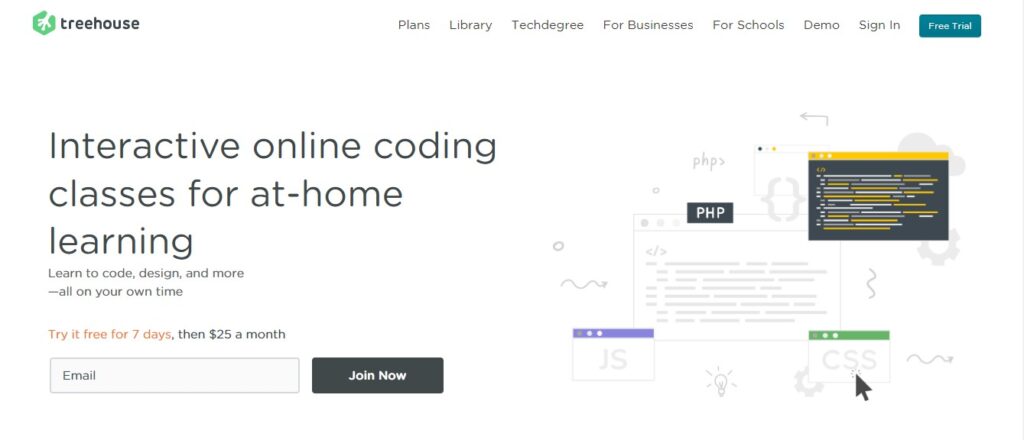
Treehouse is a one-stop shop for coding education, offering video tutorials, interactive coding exercises, and real-life projects. The platform’s unique approach to education combines visual instruction with hands-on coding exercises. Treehouse stands out as a top choice for its interactive and effective approach.
Treehouse’s mission is to make the tech industry more accessible to individuals from underrepresented backgrounds. With various learning paths available, Treehouse prepares individuals for job readiness in the tech industry. The Techdegree program caters to both seasoned professionals and beginners, providing comprehensive preparation for tech job applications. Participants can build a strong portfolio through project work while benefiting from exceptional peer and staff support.
Pros:
- Interactive Learning: Engaging videos and quizzes to reinforce learning.
- Structured Tracks: Clear learning paths for different topics.
- Beginner-Friendly: Courses designed to be accessible for beginners.
- Active Community: Forum and Slack channel for peer support.
Cons:
- Subscription Fee: Requires a monthly subscription.
- Less Advanced Content: May not offer enough depth for very advanced learners.
- Limited Offline Access: Content requires an internet connection to access.
8. GitHub

GitHub is a popular and complete coding platform developers use worldwide. It is used by over 94 million developers, including exciting startups and 90% of Fortune 100 enterprise companies. It is a web-based platform that provides various tools for version control, collaboration, and project management. With GitHub, developers can easily share their code with others, contribute to open-source projects, and collaborate with other developers.
It offers automated workflows, out-of-the-box CI/CD, built-in AI, supercharged collaboration tools, and embedded security throughout the developer workflow to ensure secure software development. Guthub is, therefore, a platform where people from anywhere can create anything they want. It is the go-to place for software development.
Pros:
- Collaboration Tools: Excellent tools for version control and team collaboration.
- Open Source Community: Access to a vast number of open-source projects.
- Documentation: Strong documentation and issue-tracking features.
- Integration: Integrates with many other development tools.
Cons:
- Learning Curve: This can be intimidating for beginners unfamiliar with Git.
- Complexity: Advanced features may be overwhelming for new users.
- Private Repositories: Requires a paid subscription for private repositories (though GitHub now offers some free private repositories with limited collaborators).
9. Visual Studio Code
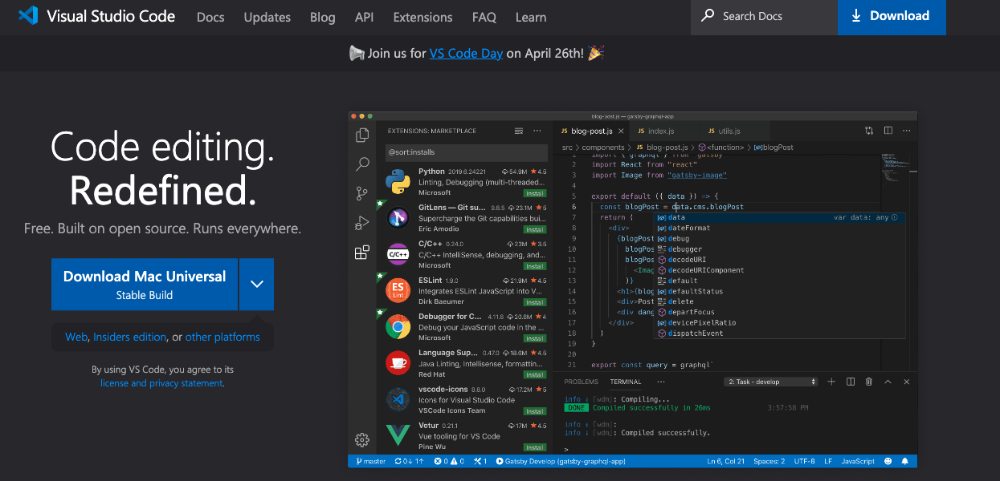
Visual Studio Code is a lightweight, cross-platform code editor that is widely used by developers. It supports a wide range of programming languages and can be customized with extensions to meet the needs of individual developers.
This platform assists businesses in creating and fixing web applications that run on Windows, Linux, and macOS. It offers many features, including syntax highlighting, navigation and refactoring of code, text wrap, snippets, Emmet abbreviations, and a command-line interface (CLI).
Pros:
- Free and Open Source: No cost and open to community contributions.
- Extensive Extensions: Large marketplace for extensions and integrations.
- Cross-Platform: Available on Windows, macOS, and Linux.
- Built-in Git Support: Integrated Git commands and version control.
Cons:
- Resource Intensive: Can be heavy on system resources.
- Configuration: Initial setup and configuration can be time-consuming.
- Limited Built-in Features: Requires extensions for many advanced features.
10. GitLab
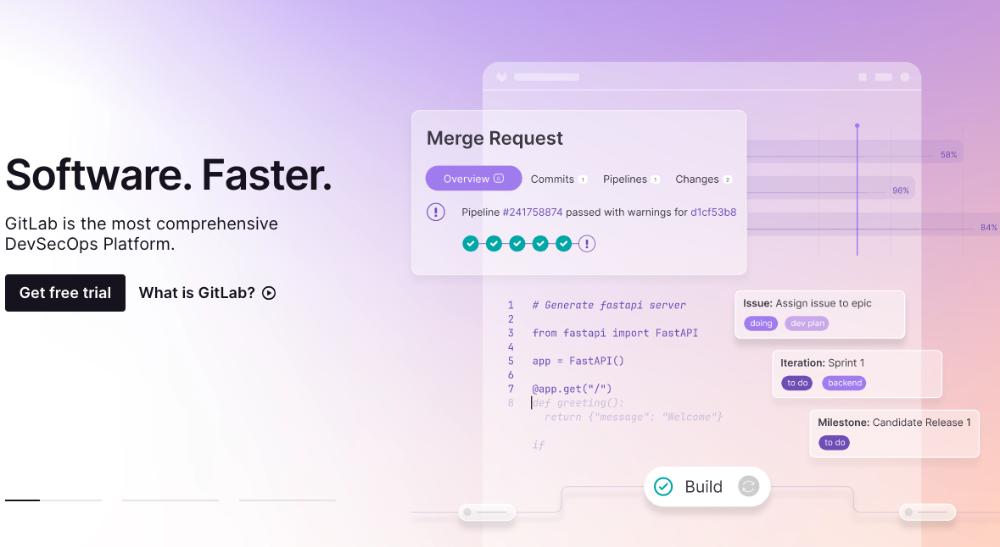
GitLab is a web-based platform that provides various tools for version control, project management, and collaboration. It helps development, security, and operations teams create better software faster. The offered features include code reviews, issue tracking, and continuous integration and deployment. GitLab is also open-source, meaning developers can customize it to meet their specific needs.
Instead of using separate tools and scripts, teams can use GitLab to quickly and continuously manage code creation, delivery, and management. GitLab supports teams throughout the entire DevSecOps lifecycle, from software development to security and deployment.
Pros:
- Comprehensive DevOps: Integrated CI/CD pipelines and DevOps tools.
- Self-Hosting Option: Can be self-hosted for full control.
- Collaboration Tools: Strong tools for team collaboration and project management.
- Security: Built-in security features and compliance tools.
Cons:
- Complex Setup: Initial setup and configuration can be complex.
- Performance: Self-hosted versions can require significant resources.
- Cost: Advanced features and enterprise support come at a cost.
11. CodePen
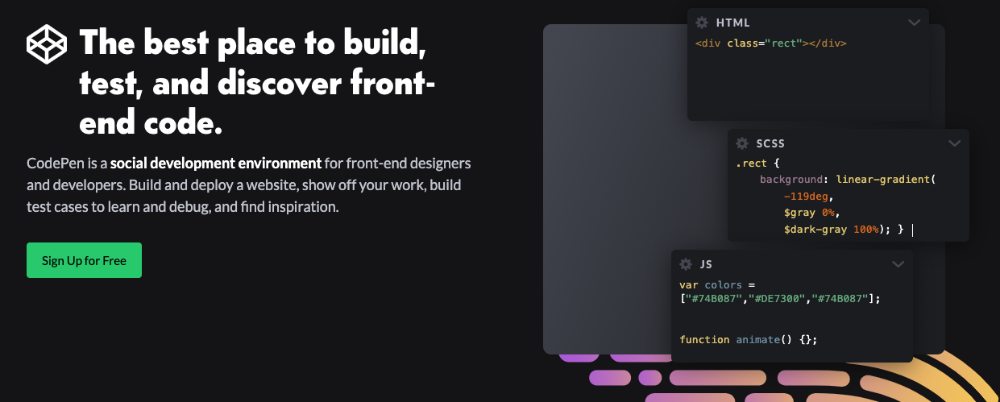
CodePen is an online code editor explicitly designed for front-end developers and designers. It offers both free and premium social development environments. With CodePen, users can create and publish their websites, learn new code, and discover new lines of code from over 1.8 million developers and designers.
The front-end code editor is fully integrated, making it easy for users of different skill levels to build and deploy their HTML, JavaScript, and CSS code for various projects. Additionally, the online tool allows users to isolate different test cases to learn and debug code. CodePen also has an integrated development environment (IDE) that enables users to create, test, and discover front-end code for any project.
Pros:
- Instant Feedback: Live preview of code changes.
- Community Sharing: Easy to share and collaborate on code snippets.
- Learning Resource: Great for learning and experimenting with front-end technologies.
- Showcase Work: A platform to showcase your projects and get feedback.
Cons:
- Limited to Front-End: Primarily for HTML, CSS, and JavaScript; less useful for back-end development.
- Free Version Limitations: Some features require a Pro subscription.
- No Version Control: Lacks advanced version control features found in Git-based platforms.
12. Repl.it
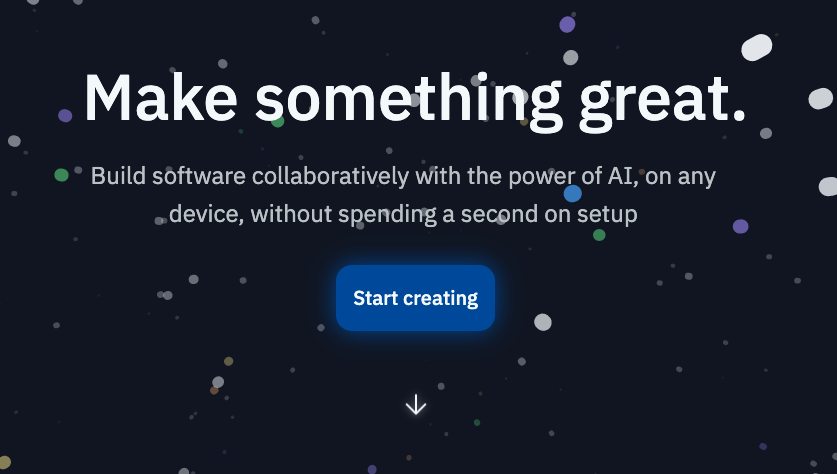
Repl.it is an easy-to-use cloud-based platform accessible from anywhere with an internet connection. It’s perfect for beginners learning to code and allows for remote collaboration and working on projects on the go. It is also a great platform for teaching programming and offers a range of tools for educators and students.
The platform supports multiple programming languages and frameworks like Python, JavaScript, and Ruby. This allows developers to work on different projects all in one place. The platform also has an interactive shell, which lets you test and run code in real-time, making it easier to catch errors. Additionally, Repl.it provides collaboration tools, like live sharing and real-time collaboration, that make it simple to work on projects with others.
Pros:
- Multi-Language Support: Supports a wide range of programming languages.
- Collaborative Coding: Real-time collaboration features.
- Ease of Use: Simple, user-friendly interface suitable for quick coding tasks.
- Accessibility: No setup is required; code directly in the browser.
Cons:
- Performance Limitations: This may be slower for large-scale projects compared to local development environments.
- Limited Features: Lacks some advanced features and integrations.
- Free Tier Limitations: Some features and more intensive usage require a subscription.
Enhancing Coding Platforms with ZEGOCLOUD: Real-Time Communication for Developers
In the dynamic world of software development, coding platforms play a pivotal role in shaping developers’ skills. However, integrating real-time communication tools can significantly elevate these platforms’ collaborative experience and efficiency. Enter ZEGOCLOUD, a robust provider of real-time audio and video communication services. By leveraging ZEGOCLOUD, coding platforms can offer seamless, high-quality communication features that enhance user interaction, foster teamwork, and streamline the development process.
By integrating ZEGOCLOUD’s real-time communication capabilities, coding platforms can transform into fully interactive environments that foster collaboration and improve learning outcomes. Developers can engage in virtual pair programming, participate in real-time code reviews, and attend live coding sessions with expert instructors, all while enjoying uninterrupted, high-quality communication. This integration not only enhances the user experience but also accelerates the development process and improves overall productivity.
Conclusion
The 10 coding platforms mentioned in this article offer a range of options for teaching coding and coding education. Whether you’re a beginner or an advanced coder, these platforms can help you achieve your goals and improve your coding skills. Choose the one that fits your needs, and start your coding education today!
Read more:
- Best 10 Developer Blog & Tech Blog Examples
- Swift vs. Objective-C: How to Choose for iOS App Development?
Coding Platforms FAQ
Q1: Which platform is best for coding?
GitHub is widely considered one of the best platforms for coding, offering version control, collaboration tools, and an extensive open-source community. Other popular platforms include GitLab and Bitbucket.
Q2: What is the best platform to write code on?
Visual Studio Code is one of the most popular code editors, known for its versatility, extensions, and support for multiple languages. Other great options include JetBrains IDEs (like IntelliJ IDEA) and Sublime Text.
Q3: What is the best site to learn coding?
freeCodeCamp and Codecademy are highly recommended for beginners. Platforms like LeetCode and HackerRank are excellent for practicing coding challenges and preparing for technical interviews.
Q4: What is the best coding system?
The term “coding system” can vary, but Git is considered the best for version control. For actual coding paradigms, Object-Oriented Programming (OOP) and Functional Programming are widely used, depending on the project’s needs.
Let’s Build APP Together
Start building with real-time video, voice & chat SDK for apps today!










